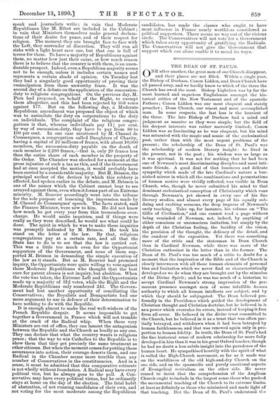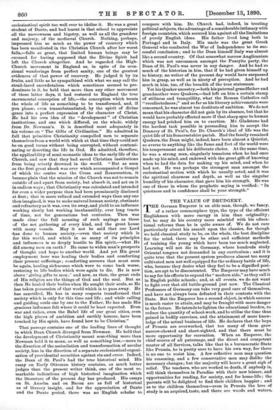THE DEAN OF ST. PAUL'S.
ONE after another, the great men of our Church disappear, and their places are not filled. Within a single year, the Bishop of Durham, Canon Liddon, and Dean Church have all passed away, and we hardly know to which of the three the Church has owed the most. Bishop Lightfoot was by far the most learned and sagacious Englishman amongst the his- torical critics of the New Testament and of the apostolic Fathers ; Canon Liddon was our most eloquent and stately preacher ; Dean Church, our wisest and most accomplished man. In some respects, the last loss is the heaviest of the three. The late Bishop of Durham had a mind and judgment as massive as they were simple, but the field of his deepest interests was rather narrowly limited; Canon Liddon was as fascinating as he was eloquent, but his mind was saturated with the magic and music of the ecclesiastical past, rather than with the most urgent problems of the present ; the scholarship of the Dean of St. Paul's was the scholarship of modern literary insight : he lived in the present, not in the past ; his wisdom was as large as it was spiritual. It was not for nothing that he bad been one of Newman's most discriminating disciples and most inti- mate friends. A good deal of that luminous and delicate sympathy which made of the late Cardinal's nature a bur- nished mirror in which all the combinations and permutations of human motive were vividly reflected, was visible in Dean Church, who, though he never submitted his mind to that dominant ecclesiastical conception of Christianity which runs through Newman's, yet showed in every one of his fine literary studies, and almost every page of his equally sub- duing and exalting sermons, the deep impress of Newman's
early teaching. Take up, for instance, his volume on " The Gifts of Civilisation," and one cannot read a page without
being reminded of Newman, not, indeed, by anything of either conscious or unconscious imitation, but simply by the depth of the Christian feeling, the lucidity of the vision, the precision of the thought, the delicacy of the detail, and the candour of the exposition. Yet there was something more of the critic and the statesman in Dean Church than in Cardinal Newman, while there was more of the Christian enthusiast in the latter than in the former. The Dean of St. Paul's was too much of a critic to doubt for a moment that the inspiration of the Bible and of the Church is closely interwoven with all those human elements of personal bias and limitation which we never find so characteristically developed as we do when they are brought out by the stimulus of the Divine Spirit ; and he was too much of a historian to accept Cardinal Newman's strong impression of the per- manent presence amongst men of some infallible human authority to which all human intellects are subject, and by which they should be subjugated. The Dean believed pro- foundly in the Providence which guided the development of Christian thought and Christian doctrine, but he believed in it as a power which overrules its errors, instead of keeping it free from all error. He believed in the divine trust committed to the Church, but he believed in it as a trust that was often par- tially betrayed, and withdrawn when it had been betrayed by human faithlessness, and that was renewed again only in pro- portion to human fidelity. In truth, the Dean of St. Paul's had the fine historical sense of modern scholarship far more fully developed in him than it was in his great Oxford teacher, though he had no doubt a less subtle insight into the paradoxes of the human heart. He sympathised heartily with the spirit of what is called the High-Church movement, so far as it made was on the worldliness of the old high-and-dry Church on the one side, and on the spasmodic and purely emotional aspects of Evangelical revivalism on the other side. He never ceased to insist that the comprehension of the Anglican Church ought to include in the largest sense those who pushed the sacramental teaching of the Church to its extreme limits, at least as definitely as those who minimised and made light of that teaching. But the Dean of St. Paul's understood the ecclesiastical spirit too well ever to idolise it. He was a great student of Dante, and had learnt in that school to appreciate all the narrowness and bigotry, as well as all the grandeur and majesty, of the mediaeval Church. Nothing, perhaps, impressed him so much as the power of recovery which bas been manifested in the Christian Church after her worst falls,—falls so great, that limited human beings may be -excused for having supposed that the Divine Spirit had left the Church altogether. And he regarded the High- Church movement in England as, in spite of its MOS- sional wanderings from perfect sanity, one of the greatest evidences of that power of recovery. He judged it by its fruits, and little as he sympathised with what we may call the strait-laced sacerdotalism which sometimes seemed to pre- dominate in it, he held that more than any other movement of these latter days, it had restored to England the true sacramental conception of life,—the conception which treats the whole of life as something to be transformed, and, if Ton please, even transubstantiated, by the spirit of divine -grace into a perfect expression of the character of Christ. He had his own idea of the " development " of Christian --institutions, and one which differed, on the whole, widely from Dr. Newman's. It is described most adequately in his volume on " The Gifts of Civilisation." He admitted in full that primitive Christianity compelled men to separate themselves from a world with which at that time they could not be on good terms without being corrupted, without contami- nating or deserting the life in God. He admitted, therefore, the applicability of semi-monastic ideas to the early life of the Church, and saw that they had saved Christian institutions from being utterly drowned in the world. " But as soon as the first great shock was over which accompanied a Gospel of which the centre was the Cross and Resurrection, it became plain that the mission of the Church was not to remain outside of and apart from society, but absorb it, and act on it in endless ways ; that Christianity was calculated and intended for even a wider purpose than had been prominently disclosed at first; that in more refined and extended ways than any one then imagined, it was to make natural human society, obstinate and refractory as it was, own its sway, and yield to an influence working slowly but working inexhaustibly, over long tracts of time, not for generations but centuries. Then was made clear the full meaning of such sayings as those of the net gathering of every kind, and the great house with many vessels. May it not be said that our Lord Bras done to human society,—even that society which is -for this world, and which in so many of its principles and influences is so deeply hostile to His spirit,—what He did among men on earth P He came to widen man's prospects of thought and hope to another world. And yet His great employment here was healing their bodies and comforting their present sufferings ; comforting sorrows that must soon be again, healing sicknesses which were to come back worse, restoring to life bodies which were again to die. He is now above giving gifts to men ; ' and now, as then, the great ends of His religion are the things of God and the soul. But as then He healed their bodies when He sought their souls, so He has taken possession of that world which is to pass away. He -has sanctified, He has in many respects transformed that society which is only for this time and life ; and while calling and guiding souls one by one to the Father, He has made His gracious influence felt where it could be least expected. Even war and riches, even the Babel life of our great cities, even the high places of ambition and earthly honour, have been touched by His spirit, have found how to be Christian."
That passage contains one of the leading lines of thought in which Dean Church diverged from Newman. He held that the development of Christianity meant something more than Newman held it to mean, as well as something less,—more in the direction of the assimilation and transformation of secular society, less in the direction of a separate ecclesiastical organi- sation of providential securities against sin and error. Indeed, the Dean of St. Paul's had the true historical mind. His essay on Early Ottoman history contains, as much better judges than the present writer think, one of the most re- markable indications of high historical imagination which the literature of the present day has produced. His essays on St. Anselm and on Bacon are as full of historical as of literary insight, and for the appreciation of Dante and the Dante period, there was no English scholar to compare with him. Dr. Church had, indeed, in treating political subjects, the advantage of a considerable intimacy with foreign countries, which secured him against all the limitations of purely English ideas. His father lived long both in Portugal and in Italy. His uncle was the great Greek General who conducted the War of Independence to its suc- cessful conclusion ; and to the Dean himself Italy was almost
like a second country. Of that somewhat narrow Anglicanism which was not uncommon amongst the Puseyite party, the Dean of St. Paul's was never in any danger. And he had so much of the historian in him, that if he had given himself up to history, no writer of the present day would have surpassed him in grasp, as well as in nicety of perception. And he had much in him, too, of the breadth of the true statesman.
Yet his Quaker ancestry,—both his paternal grandfather and grandmother were Quakers,—had left on him a certain stamp of stillness and tranquillity, what the Roman Catholics call " recollectedness ;" and so far as his literary achievements were concerned, he was almost too destitute of ambition. We do not mean that his character did not gain by its absence, but that he would have probably effected more if that sharp spur to human energy had pricked him on to exertion. Mr. Gladstone had the hardest task possible in persuading him to accept the Deanery of St. Paul's, for Dr. Church's ideal of life was the quiet life of his Somersetabire parish. Had the family remained Quakers, the Dean might, indeed, have been almost a Quietist, so averse to anything like the fume and fret of the world were his temperament and his deliberate choice. At the same time, he was a strong man, singularly tenacious when he had once made up his mind, and endowed with the great gift of knowing when be had the data for making up his mind, and when he had not. He was perhaps the strongest man amongst the ecclesiastical section with which be usually acted, and it was the spiritual clearness and depth, as well as the singular humility of his character, that gave him his strength. He was one of those in whom the prophetic saying is verified : " In quietness and in confidence shall be your strength."











































 Previous page
Previous page